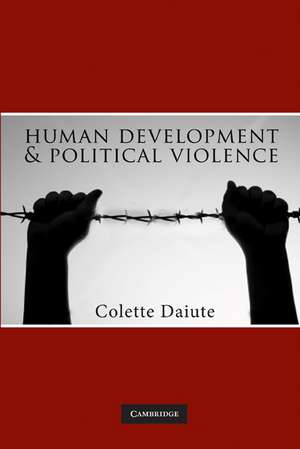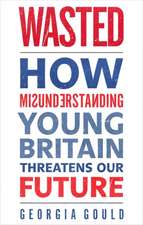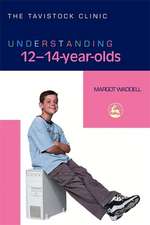Human Development and Political Violence
Autor Colette Daiuteen Limba Engleză Paperback – 25 apr 2010
| Toate formatele și edițiile | Preț | Express |
|---|---|---|
| Paperback (1) | 249.32 lei 6-8 săpt. | |
| Cambridge University Press – 25 apr 2010 | 249.32 lei 6-8 săpt. | |
| Hardback (1) | 429.57 lei 6-8 săpt. | |
| Cambridge University Press – 29 apr 2010 | 429.57 lei 6-8 săpt. |
Preț: 249.32 lei
Nou
Puncte Express: 374
Preț estimativ în valută:
47.71€ • 51.81$ • 40.08£
47.71€ • 51.81$ • 40.08£
Carte tipărită la comandă
Livrare economică 22 aprilie-06 mai
Preluare comenzi: 021 569.72.76
Specificații
ISBN-13: 9780521734387
ISBN-10: 052173438X
Pagini: 304
Ilustrații: 20 b/w illus. 1 map 15 tables
Dimensiuni: 151 x 229 x 18 mm
Greutate: 0.41 kg
Editura: Cambridge University Press
Colecția Cambridge University Press
Locul publicării:New York, United States
ISBN-10: 052173438X
Pagini: 304
Ilustrații: 20 b/w illus. 1 map 15 tables
Dimensiuni: 151 x 229 x 18 mm
Greutate: 0.41 kg
Editura: Cambridge University Press
Colecția Cambridge University Press
Locul publicării:New York, United States
Cuprins
1. Beyond the youth gap in understanding political violence; 2. Youth and society work together; 3. Living history; 4. From frozen narratives to critical narrating; 5. Power genres; 6. Sociobiographies; 7. Human development in conflict.
Recenzii
"Colette Daiute's interviews with adolescents who lived through the tragic smash-up of Yugoslavia are gripping. The story that emerges is a mix of stout courage and deep uncertainty, the tale of a generation growing up in a world that they must reconstruct, despite their doubts. Yet, there runs through it what might well be called a persistent sense of a possible future."
–Jerome Bruner, New York University
"An innovative approach to listening to youth in the context of political violence, this is essential reading for policy makers, researchers, and development workers on how to effectively tap the potential of youth and to ensure their positive contribution to societies emerging from the ravages of political conflict."
–Victor Karunan, Chief, Adolescent Development and Participation, UNICEF
“This is an extraordinary, powerful book that contributes to our deeper understanding of the complexities and dynamism of young people’s experiences in the context of dramatic social changes, which put their well-being and development at risk. It challenges some common approaches to the explanation of the impact of political violence, militant ideologies and armed conflicts on the way young people conceptualise their environments and develop their potentials. Drawing from the cultural-historical theory that explains human development in terms of daily interactions between the individual and the society, the author engages in an in-depth inquiry into the meaning-making of young people living in the violent context. Highly recommended for educational researchers, policy-makers and practitioners, a thorough analysis of these narratives proves the importance of taking into account the voices of young people in all aspects of education.”
–Vedrana Spajic-Vrkas, University of Zagreb, Croatia
“Colette Daiute has written a moving, insightful, and inspirational account of her interventions and research with children who have suffered from political violence. She offers concrete examples of how to use writing to help children process their experiences and move forward in positive ways. Our hope for breaking cycles of violence lies in healing the next generation. This book is a must-read for those interested in human rights and children's rights.”
–Sarah Warshauer Freedman, University of California, Berkeley
"...the author offers a well-written exposition of the richly informative narratives that emerged through her system of discourse analysis... readers should be prepared to discover important scientific findings in lengthy sections of text, a format different from what researchers would expect... Recommended..."
–P. Flattau, Institute for Defense Analyses, CHOICE
"...Human Development and Political Violence is a deeply inspiring work... By consulting the next generation and affording them a role in public affairs, Daiute’s approach may offer a solution for peaceful resolutions of societal conflict from youths whose ideas touch one’s heart."
–Sherry Lynn Hatcher, PsycCRITIQUES
"....constitute groundbreaking examples of studies that move away from the more usual research focus on trauma and listen – really listen – to adolescents’ emerging and evolving complicated voices.... Colette Daiute’s [2010] volume demonstrates how an adolescent’s abilities to draw on multiple, alternative meanings to make sense of his/her world may act as a basic capacity that underlies resilience.... Many readers will also appreciate the weight that Daiute places on adolescents’ own narrative accounts and stories – the compelling voices of her young participants remained with us long after we had finished reading her book.... forward-looking.... make clear that young people’s subjective interpretations of their own experiences provide a way to simultaneously understand both protective and maladaptive developmental processes and a rich glimpse into the wealth of information, both hopeful and heartbreaking, that can be derived from youths’ own voices...."
–Holly E. Recchia, Concordia University and Cecilia Wainryb, University of Utah, Human Development
"....The book as a whole illustrates not only how qualitative research is done, but why—these young people occupy a unique place in history, and they must be heard for themselves, regardless of the generalizability of their experiences to other places and times.... What is most fascinating about this book, however, is the workshop approach itself, which allowed the participants to shape the information gathered (by writing their own surveys), analyze the views of other participants, and “speak truth to power” by conveying their own views to government officials...."
–Bridget A. Franks, University of Florida, Journal of Applied Developmental Psychology
"...This book gives hope and provides some ideas how youth may be supported in their efforts to critique a violent world, imagine alternatives to conflict, and be empowered to take action in their communities to come closer to this goal."
–Johanna Ray Vollhardt, Psychology Department, Clark University, Peace and Conflict
–Jerome Bruner, New York University
"An innovative approach to listening to youth in the context of political violence, this is essential reading for policy makers, researchers, and development workers on how to effectively tap the potential of youth and to ensure their positive contribution to societies emerging from the ravages of political conflict."
–Victor Karunan, Chief, Adolescent Development and Participation, UNICEF
“This is an extraordinary, powerful book that contributes to our deeper understanding of the complexities and dynamism of young people’s experiences in the context of dramatic social changes, which put their well-being and development at risk. It challenges some common approaches to the explanation of the impact of political violence, militant ideologies and armed conflicts on the way young people conceptualise their environments and develop their potentials. Drawing from the cultural-historical theory that explains human development in terms of daily interactions between the individual and the society, the author engages in an in-depth inquiry into the meaning-making of young people living in the violent context. Highly recommended for educational researchers, policy-makers and practitioners, a thorough analysis of these narratives proves the importance of taking into account the voices of young people in all aspects of education.”
–Vedrana Spajic-Vrkas, University of Zagreb, Croatia
“Colette Daiute has written a moving, insightful, and inspirational account of her interventions and research with children who have suffered from political violence. She offers concrete examples of how to use writing to help children process their experiences and move forward in positive ways. Our hope for breaking cycles of violence lies in healing the next generation. This book is a must-read for those interested in human rights and children's rights.”
–Sarah Warshauer Freedman, University of California, Berkeley
"...the author offers a well-written exposition of the richly informative narratives that emerged through her system of discourse analysis... readers should be prepared to discover important scientific findings in lengthy sections of text, a format different from what researchers would expect... Recommended..."
–P. Flattau, Institute for Defense Analyses, CHOICE
"...Human Development and Political Violence is a deeply inspiring work... By consulting the next generation and affording them a role in public affairs, Daiute’s approach may offer a solution for peaceful resolutions of societal conflict from youths whose ideas touch one’s heart."
–Sherry Lynn Hatcher, PsycCRITIQUES
"....constitute groundbreaking examples of studies that move away from the more usual research focus on trauma and listen – really listen – to adolescents’ emerging and evolving complicated voices.... Colette Daiute’s [2010] volume demonstrates how an adolescent’s abilities to draw on multiple, alternative meanings to make sense of his/her world may act as a basic capacity that underlies resilience.... Many readers will also appreciate the weight that Daiute places on adolescents’ own narrative accounts and stories – the compelling voices of her young participants remained with us long after we had finished reading her book.... forward-looking.... make clear that young people’s subjective interpretations of their own experiences provide a way to simultaneously understand both protective and maladaptive developmental processes and a rich glimpse into the wealth of information, both hopeful and heartbreaking, that can be derived from youths’ own voices...."
–Holly E. Recchia, Concordia University and Cecilia Wainryb, University of Utah, Human Development
"....The book as a whole illustrates not only how qualitative research is done, but why—these young people occupy a unique place in history, and they must be heard for themselves, regardless of the generalizability of their experiences to other places and times.... What is most fascinating about this book, however, is the workshop approach itself, which allowed the participants to shape the information gathered (by writing their own surveys), analyze the views of other participants, and “speak truth to power” by conveying their own views to government officials...."
–Bridget A. Franks, University of Florida, Journal of Applied Developmental Psychology
"...This book gives hope and provides some ideas how youth may be supported in their efforts to critique a violent world, imagine alternatives to conflict, and be empowered to take action in their communities to come closer to this goal."
–Johanna Ray Vollhardt, Psychology Department, Clark University, Peace and Conflict
Notă biografică
Descriere
Presents an innovative approach to research and practice with young people growing up in the context of political violence.












